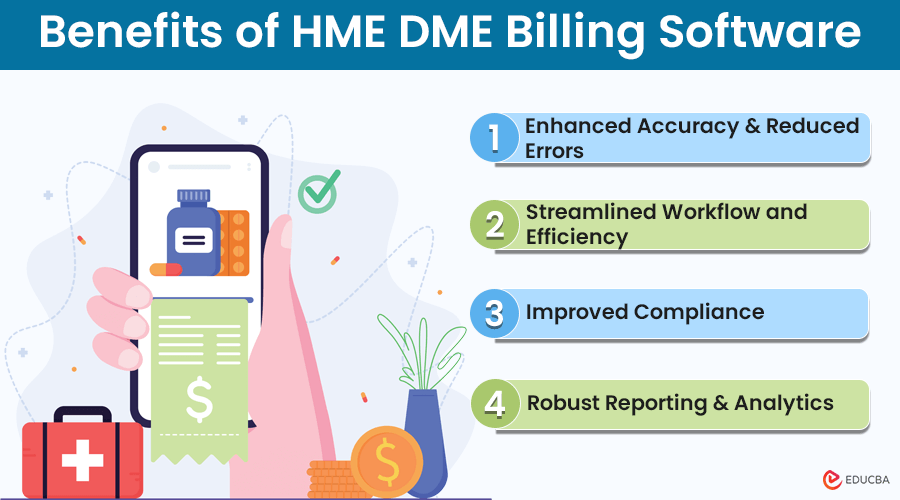
What is HME DME Software?
Healthcare organizations need appropriate and effective medical billing to maintain their financial health, particularly when handling durable medical equipment (DME) such as wheelchairs, nebulizers, and other items required to care for patients at their homes. DME billing is one of the most challenging tasks for medical practices due to numerous factors and changes in billing rules and regulations. That is why HME DME software (Home medical equipment and durable medical equipment billing software) helps billing assistants optimize the process and guarantee timely top-up reimbursements.
Why Do You Need HME DME Software?
DME billing requires special attention to detail. One error in coding chart documentation or claim submission can result in claim denial, delayed payment, and revenue loss.
Studies paint a concerning picture: A 2020 American Academy of Family Physicians (AAFP) bulletin showed that the status had a mean claim rejection charge of 8.6% for outpatient services because of improper coding and billing. Such denials can be significant in the DME industry where they can barely make a profit at all.
Aside from the financial problem, poor DME billing can also affect the flow of patient care. Any hold-up in this regard means that they cannot obtain proper resources in terms of new equipment or even replenishment of old stock, which affects the quality of services to patients.
Benefits of HME DME Billing Software
DME billing and HME software come together as a knight in shining armor for helping organizations navigate the tough terrain of DME billing.
Here’s how this technology empowers medical practices:
- Enhanced Accuracy and Reduced Errors:
DME billing software lowers the chances of human errors, such as in coding and claim scrubbing. This reduces the incidence of human mistakes and also makes the process of submitting claims the highest level of accuracy at the initial instance.
- Streamlined Workflow and Efficiency:
DME software has features that contribute to the billing cycle by aiding in order transactions and submitting claims. It not only saves time and money but also relieves the workforce to perform other, more important duties, such as tending to the patients.
- Improved Compliance:
Legal requirements regarding the billing of durable medical equipment always change. To avoid problems in audits, DME software usually works on the Healthcare Common Procedure Coding System (HCPCS) code set.
- Robust Reporting and Analytics:
DME software offers daily, weekly, or monthly reports on claims filed, denials obtained, and income made. These observations enable healthcare providers to diagnose trends and decide on appropriate measures regarding billing processes.
How to Choose the Right HME DME Billing Software?
The choice of the right DME billing and HME software for the practice is essential among the numerous available options.
Here are some key considerations:
- Compliance: Choose the software that is current with HCPCS codes and related laws and updates automatically.
- Automation: Search for options that can perform initial coding, eligibility checking, and claim checks to reduce the time it takes to do these.
- Integration: It must be fully interoperable with your current EHR (Electronic Health Record) system; otherwise, you won’t be able to collect and store data in it.
- Reporting and Analytics: Effective reporting is critical, especially in tracking claims performance and any shift towards denial of claims, as well as in general decision-making regarding a healthcare concern’s finances.
- Security: Make sure that the software offers to protect patient information data in compliance with HIPAA regulations.
Improvement Strategies Concerning the Management of Billing for DME
While DME billing and HME software work well independently, you can realize their full potential by integrating with various components.
Consider these strategies:
- Invest in Staff Training: It is recommended that you periodically train your staff on the related rules regarding DME billing and coding.
- Develop a Strong Denial Management Process: Ensure there is a way to appeal for the denied claims in the shortest time possible to enhance the chances of receiving the payment.
- Partner with a DME Billing Specialist: When the practice has a high patient volume being billed for diverse DME equipment, outsourcing billing is a good option because specialists have dedicated staff and equipment.
Final Thoughts
When it comes to DMEs and their bills, it is more than just a financial concern; it is a matter of whether patients get their vital equipment on time to lead healthy lives or not. By integrating DME billing and HME software with other strategies, medical practices can reinvent their DME billing process. This means fewer denials, quicker repayments, and, in the end, better checkbook health.
Recommended Articles
We hope this article clarifies your confusion regarding HME DME software and helps you choose the right one for your needs. For similar informative content, you can read our other blogs.

